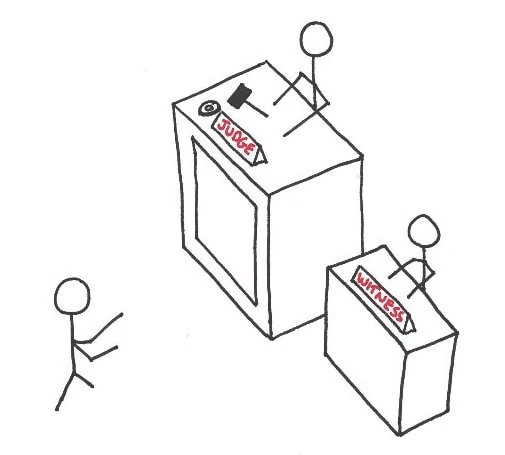I’m currently taking a course on managing workplace performance, and as part of the readings, we were given an excerpt from a book entitled “Fundamentals of Trial Techniques” which I thought was very intriguing.
I couldn’t help but notice the parallels between how a trial lawyer questions his or her witnesses and how an effective project manager conducts an investigation of a major issue with his or her team.
Here are four techniques that lawyers use in court which can be used to effectively investigate a project issue:
- Force a time-line Lawyers try to make their witness’s story as simple as possible for the jury to understand, so they naturally force the witness to go through a sequence of events. When trying to find out the root cause of an issue, start out by saying something like “Let’s start from the top. Walk me through how this happened from the beginning.” Then, just like a good lawyer would do, ask “So, what happened next?” or “What did you hear after that?” to keep on track with the time-line.
- Avoid leading questions: In law systems, “leading questions” are those that suggest an answer, and are usually not allowed by a judge. For example, “You were at the club on the night of January 22, weren’t you?” is a leading question. A non-leading version of that question would be “Where were you on the night of January 22?” In a project team, you want to avoid asking leading questions because they could sound probing and quite intimidating – especially in a virtual setting. So instead of asking “Did you send him the email after you saw the status report?” ask “What happened after you saw the status report?”
- Interrupt to ask for an explanation: It’s always a waste of time if you let someone carry on talking about something you don’t understand (hoping that you will a little later – which almost never happens). Lawyers are never shy about interrupting a witness so that the jury understands what is meant by every word. As a project manager, you should do the same. When is doubt, asking something like “What exactly do you mean by that?” or “I’m a bit confused, could you please elaborate on what you just said?” always helps.
- Repeat stuff back: To stress the importance of a point, or to make sure they understand, lawyers usually repeat what they heard by rephrasing the witness’s words. It is a best practice for managers to do that intermittently, as well as at the end of a conversation, to make sure that the facts are summarized correctly.
Of course, you want to make sure you put other witnesses on the stand so you don’t rely on just one testimony. Keep one thing in mind though: the people you’re questioning are your witnesses. You’re not doing any cross-examination here, so avoid the Tom Cruise “DID YOU ORDER THE CODE RED?!” tone 🙂


Super helpful!! Thanks for this great advice. You have a very clear writing style, too.
Are you taking up the 8-step challenge from Michael Ellsberg & Tim Ferriss?
Wishing you the best,
Heidi
Thanks Heidi! Appreciate the kind comments. Unfortunately I won’t be taking up the challenge because I’d be disqualified 🙂 (apparently you can only join if you’re “starting from scratch” in a new field). Hope you win if you’re taking that up though!